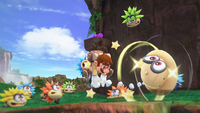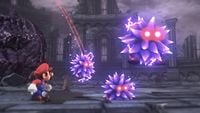Burrbo
- Not to be confused with Barbos.
A Burrbo is a small spiked seed type enemy appearing in Super Mario Odyssey, debuting in the Cascade Kingdom, and returning in the Seaside Kingdom, Dark Side, Metro Kingdom, Ruined Kingdom, Bowser's Kingdom, Mushroom Kingdom and the Darker Side. They come in five different colors: green, orange, yellow, pink and blue. They attack by hopping towards Mario. They have two legs and no arms, they are found in large groups, and can be defeated easily with a hat throw. They cannot be Captured and more will rise from the ground when the others are defeated. The design for their eyes closely resembles Cappy's, while the design for their mouths resemble those of Goombas.
Purple Burrbos also appear during the fight against the Ruined Dragon. They don't have mouths, but instead have two small red and white circles for their eyes. They come out of spots previously occupied by sword-shaped pins on the dragon's head and try to attack Mario with electricity and can hop towards him faster than normal ones.
Etymology
Their name comes from "burr," a term referring to a thorny seed that is known for getting stuck in clothing, and possibly "Kuribo," the Japanese name for Goomba, in reference to their Goomba-like appearance and stature. However, the "-bo" in Kuribo actually means "person" or "people."
Names in other languages
| Language | Name | Meaning | Notes |
|---|---|---|---|
| Japanese | イガボー[1] Igabō |
From「毬」(iga, burr), and possibly Kuribō, Goomba's Japanese name. | |
| German | Dornaldo[2] | ? | |
| Italian | Pungino[?] | Combination of "Pungere" (to sting) and the suffix "-ino" (meaning little, small) |
References
- ^ Official Japanese Mario Odyssey Twitter
- ^ Official Prima Game Guide[page number needed]

